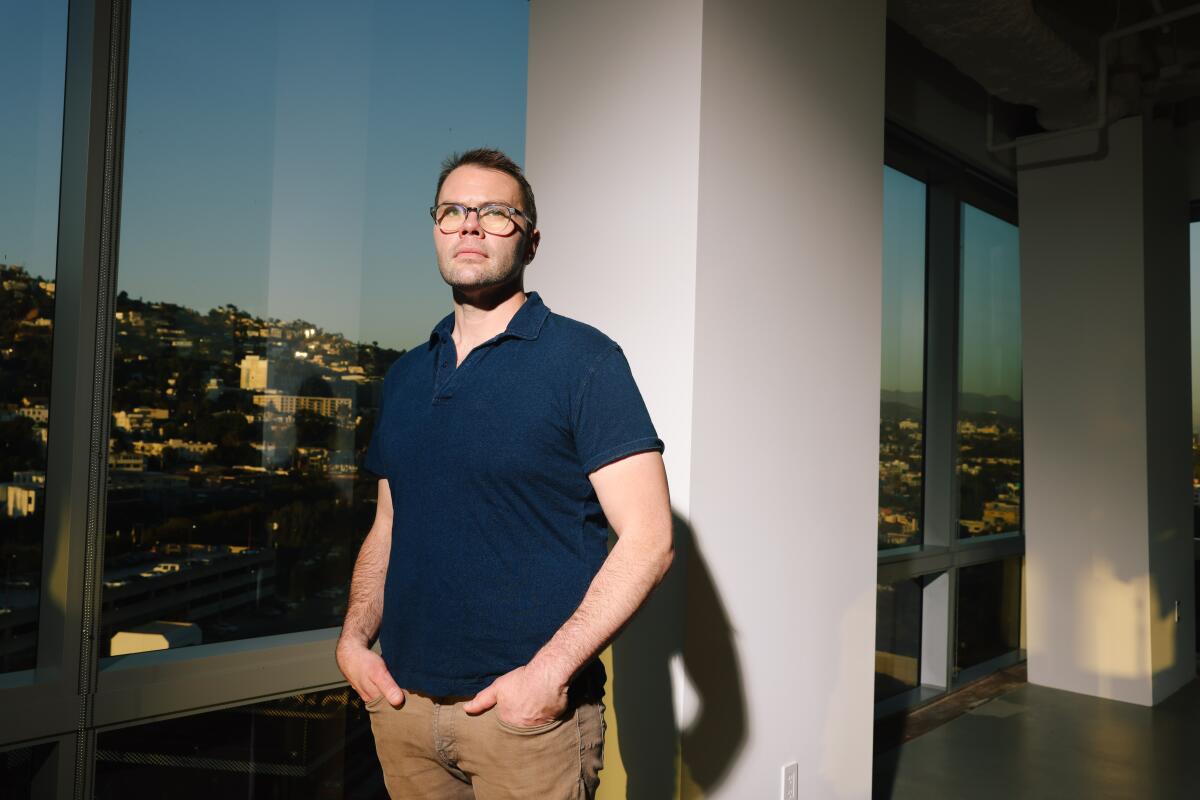Writer Samuel D. Hunter digs deep to let loose his truth for ‘The Whale’

- Share via
I didn’t set out to write a film. At first, I wasn’t even sure I was writing a play.
Maybe it was something I needed to write for myself, a quiet purgation that I’d keep in the cold, dark storage of my laptop’s hard drive forever.
Maybe keeping it to myself would allow me to put some personal stuff on the line that I’d previously been too scared or too embarrassed to access in my plays. The stuff that made me feel unworthy of being an erudite New York playwright. All that stuff I had pushed way down about growing up gay in Idaho, attending a fundamentalist Christian school, battling depression and subsequently self-medicating with food in my late teens and early 20s.
Maybe I should just write something honest.
This was 13 years ago. My then-boyfriend-now-husband and I were living in an illegal sublet in Hell’s Kitchen and teaching essay writing at a public university in New Jersey to dozens of disaffected college freshmen. I was teaching a kind of writing that felt anathema to my work as a playwright — I was asking students to depersonalize their writing, to stamp out any trace of emotion or personality in service of cold, hard objectivity. But it was better than a 9-to-5. At least it was adjacent to my seemingly unreachable goal of being a working playwright in New York City. (If there’s even such a thing anymore.)
Six Oscar contenders -- Austin Butler, Paul Dano, Brendan Fraser, Jonathan Majors, Bill Nighy and Adam Sandler -- talk about family, playing real people ... and mortality.
Deep into the semester, I cracked. I couldn’t take another perfunctory analysis of whatever Malcolm Gladwell essay I had assigned them. My students were just giving me what they thought I wanted so they could take their B-minus and move on with their lives. So I pleaded with them, “Just write something honest. Don’t worry about making it a good essay. Just tell me what you truly think. Let’s start there.”
During a NJ Transit ride back home one night, I read one student’s heartbreaking truth, a line that ended up staying in the play and the screenplay throughout mountains of drafts: “I think I need to accept that my life isn’t going to be very exciting.”
That single line was a turning point in my artistic life. Because right after I read it, I had the thought: “Should I write a play about an expository writing teacher who is begging his students to write something honest? Is anyone going to want to watch that? More frightening than that, is this play a version of this exercise I had just given my students?”
I wrote the first draft in about six weeks, taking a break from grading freshmen essays every Sunday to generate 20 or so new pages of a nascent draft. Early on, I realized that not only was the character trying to connect with his students but he was also using those teaching sessions as a dry run to figure out how to connect with his estranged daughter. It felt entirely different than my previous plays. It was at once easier to write and more difficult, familiar but scarily vulnerable.
Several weeks and several drafts later, I made the decision to share it with my agent. Several months after that, the Denver Center for the Performing Arts produced a reading of it, and the following year, the center mounted a full production. Then — miracle of miracles — Playwrights Horizons, one of my favorite off-Broadway theaters, produced the play in its smaller, 125-seat theater. I had scaled the mountain.
Next came the truly unbelievable plot twist, a scene so grossly overwritten that it can be only real life — “Darren Aronofsky saw the play, and he wants to meet with you.”
It took another decade for the film adaptation to come to fruition. During those 10 years, I steadily worked on adapting the play to a screenplay, and the characters and story grew and sharpened in fundamental ways. The character of Thomas, originally a Mormon missionary (perhaps to slightly shield myself from my own past), now attends a fundamentalist church more similar to the one I was involved with as a teen. More important, my husband and I are now dads to a 5-year-old girl. So the story of a father and a daughter has become far less theoretical.
And during that decade when I was developing the screenplay, I wrote a little over a dozen plays, each of which shares the primary concern of “The Whale”: the tragedy of isolation and the redeeming value of human connection. In many ways, “The Whale” has been the clothesline upon which I’ve hung my entire body of work.
Thirteen years later, I’m glad I made the decision to take this story off my hard drive. Even though I have some distance from it now, at age 41, in certain ways it feels no less vulnerable and personal to me than when I first wrote it. But more than that, it’s been a constant reminder that I came into my own as a writer only truly when I finally took my own advice: Forget what other people want and just write something honest.
More to Read
Sign up for The Envelope
Get exclusive awards season news, in-depth interviews and columnist Glenn Whipp’s must-read analysis straight to your inbox.
You may occasionally receive promotional content from the Los Angeles Times.








